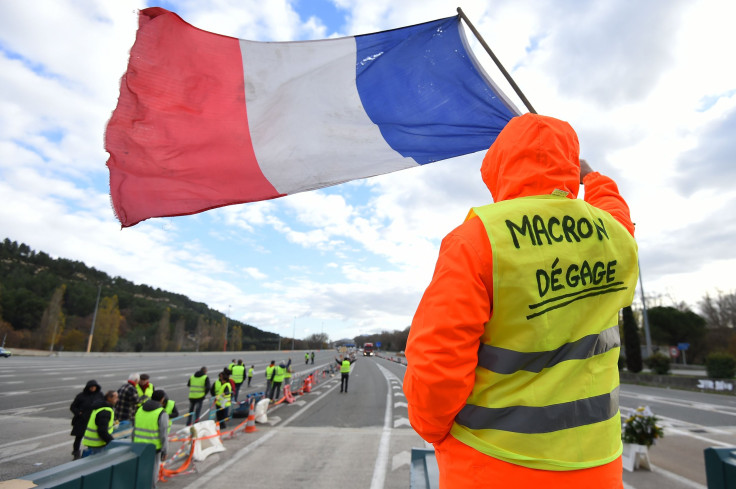Paris Protests: Reason Behind Yellow Vests Movement Raging Across France

As the Yellow Vests movement, also known as the “gilets jaunes”, continued in Paris, protesters set an oil depot on fire in La Rochelle on Sunday.
European reporter Sotiri Dimpinoudis first posted the news on social media, tweeting, “the protestors have reportedly drilled a hole at the bottom of the depot and have set that on fire with the wood barricades!”
He also posted a video of the incident that was circulating on WhatsApp in France.
#Update: an other video spreading by Whatsapp in #France of the oil depot on fire in la rochelle #GiletsJaunes #YellowVests pic.twitter.com/3v5WfPQND1
— Sotiri Dimpinoudis (@sotiridi) December 10, 2018
After a few minutes, he reported the Gendarmarie police had stormed into the oil depot and put out the fire.
While the Yellow Vests movement originally began in France as an online protest in May, it gradually assumed physical form in November. The protests started as a backlash to French President Emmanuel Macron’s economic reforms, primarily the surge in fuel taxes. The price of fuel in France saw a 20 percent hike over the past year to an average of 1.49 euros ($1.70) per liter, with the rising global oil prices playing a significant part.
On Nov. 17, around 20,000 protesters dressed in fluorescent high-visibility jackets blocked highways across France with convoys of slow-moving trucks and burned barricades. The French government refused to back down from its plan of imposing further fuel taxes starting January 2019, and the violent protests continued.
Protesters chose to wear yellow vests when protesting because since 2008, it has been mandatory for French motorists to carry fluorescent vests in their vehicles while driving, in case they were pulled over to the side of the road and they needed to step out of their vehicles. As a result, the vests came to be synonymous with drivers and became widely available in the country, Independent reported.
On Dec. 5, Macron and his administration finally gave in to the protesters’ demands and agreed to roll back the fuel tax hike that was originally intended to be implemented in order to fight global warming. However, the movement continued, with protesters listing a number of fresh demands, including a lower cost of living, revising tax reforms that adversely affected the middle class, reintroducing the solidarity tax on the wealthy, raising of the minimum wage, and ultimately the resignation of Macron, according to Reuters.
Over the last weekend, 10,000 protesters took to the streets of Paris and around 125,000 protesters demonstrated nationwide. Nearly 90,000 policemen were deployed by Macron to keep a check on potential violence and maintain the peace. Military tanks were deployed and tear gas, water cannons and rubber bullets were used against some protesters.
According to the Interior Ministry, 1,220 people were taken into custody around the country. A total of 135 people were believed to be injured, including 17 policemen. Iconic French tourist spots, such as the Eiffel Tower and the Louvre museum in Paris, remained closed Saturday for fear of structural damage. Both of them opened Sunday morning as workers cleared debris and broken glass from the streets.
On Sunday, Macron took to Twitter to praise the policemen and their work.
“To all the forces of the order mobilized today, thank you for the courage and the exceptional professionalism you have shown,” a translated version of his tweet read.
Beyond this, Macron has hardly spoken regarding the nationwide protests taking place, behavior that was criticized by members of the opposition party. For instance, Gael Perdriau, mayor of the city of Saint-Etienne, a town in southeast France, said: “This silence becomes contempt for the nation. He has a direct responsibility in what is happening. He can’t remain closed up in the Elysee.”
Macron was scheduled to address the nation this week.
While the leader of their own country stayed mum, President Donald Trump weighed in on the violent protests affecting France in a series of tweets.
"The Paris Agreement isn’t working out so well for Paris. Protests and riots all over France. People do not want to pay large sums of money, much to third world countries (that are questionably run), in order to maybe protect the environment. Chanting 'We Want Trump!' Love France,” Trump wrote in a tweet.
Jean-Yves Le Drian, the French Minister for Europe and Foreign Affairs, condemned Trump for his social media comments, saying he did not have the right to get involved in French politics.
“I say to Donald Trump, and the President of the Republic tells him too: we do not take part in American debates, let us live our life in our country," he said, ABC News reported.
© Copyright IBTimes 2024. All rights reserved.












